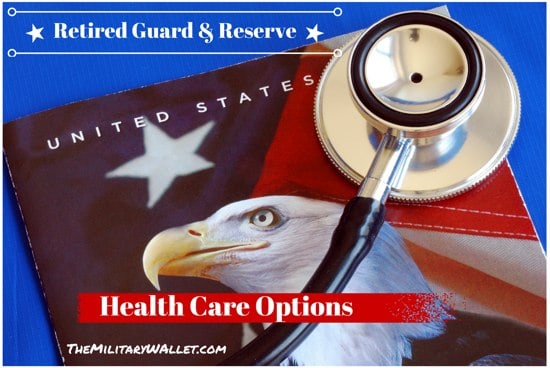Members of the Guard and Reserves have different health care options than active duty servicemembers and active duty retirees. While still serving in the Guard and Reserves, members are eligible for Tricare Reserve Select, which is a premium-based health insurance program. Its cost is very affordable, coming in at roughly $22/mo for a member or around $228/mo for a family plan.
There are very reasonable annual deductibles, coming in at $150 for an individual and $300 for a family (lower for E-1 through E-4). The maximum out-of-pocket cost (also referred to as the Catastrophic Cap) is also very reasonable, coming in at $1,044 per family per fiscal year.
These rates are much more affordable than many plans you will find through an employer and are much lower than what you would find on one of the healthcare exchanges (the maximum out-of-pocket expenses for plans on the exchanges often range from around $6,000 for an individual, up around $12,600 for a family plan).
Unfortunately, once you retire from the Guard or Reserves, you lose access to Tricare Reserve Select. You can still participate in a Tricare Reserve Select health care plan, but you would have to transfer to another plan. Let’s look at some of your healthcare options once you retire from the Guard or Reserves.
Note: Click here to learn about your healthcare options after leaving active duty.
Table of Contents
Guard and Reserve Health Care Options in Retirement
Retired members of the Guard and Reserves have several retirement plans available to them, depending upon their age, and, believe it or not, where they live. Let’s break this down by age because it isn’t until age 60 that retired members of the Reserve Corps are eligible to receive Tricare Prime, the same military health care offered to active duty retirees.
Before age 60, retired members of the Reserve Component are referred to as “Gray Area Retirees” because they are eligible for some military retirement benefits, but not all of them (notably the pension and Tricare Prime).
Retiree health care options – under age 60
Once a member retires from the Reserve Component, he or she loses access to the subsidized Tricare Reserve Select plan. They become eligible to participate in the Tricare Retired Reserve plan, which is similar to Tricare Reserve Select, but without any subsidies, and a higher Catastrophic Cap. The retiree must pay 100% of the premiums if they wish to participate in the plan. And it’s fairly expensive, at least compared to what you may be used to.
Without subsidies, Tricare Retired Reserve comes in at roughly $444/mo for the individual and about $1,066/mo for a family plan. The Catastrophic Cap for Tricare Retired Reserve is $3,655 per family, per fiscal year. This is more expensive than Tricare Reserve Select, but it may or may not be more affordable than anything you can find through an employer or on one of the health insurance exchanges.
Guard and Reserve retirees may also be eligible for some special military health care programs if they were on active duty at the time of their retirement (even if they did not earn active duty retirement benefits).
These programs may include:
- Transition Assistance Management Program (TAMP)
- Continued Health Care Benefit Program (CHCBP)
- This article covers more health care options after leaving the military.
Non-military health care options – under age 60
It may pay to shop around for less-expensive health insurance if you find the premiums for Tricare Retired Reserve to be too expensive. The obvious choice is to check with your employer if they offer health insurance. You may be also able to find a less-expensive health care option on the Health Care Exchanges. eHealthInsurance.com has a lot of great options on the Exchanges (this is the website I used to find my health insurance before I joined the Guard and became eligible for Tricare Reserve Select).
An alternative option is using a Christian Health Sharing Ministry, such as Liberty HealthShare, MediShare, or a similar organization. These organizations are similar to health insurance and satisfy the federal mandate to maintain health care coverage. I recommend reading reviews of these Christian health-sharing ministries to understand how they work and to see if they will be a good option for your needs.
Retiree health care options – age 60-65
Guard and Reserve retirees generally aren’t eligible to receive health care benefits until they turn age 60. At this time, they would be eligible for Tricare Prime, which is the same health insurance plan open to active duty military members and retirees. This includes access to health care at a Military Treatment Facility on a space-available basis. However, retirees are only eligible for Tricare Prime if they live within a certain distance of a military installation or regional health care center. If the retiree lives out of the area, they would only be eligible to receive Tricare Select. Tricare Prime and Select both have monthly premiums and associated copays, but there are some important differences.
Retiree health care options – age 65+
At age 65, Reserve Corps retirees are eligible to receive Tricare for Life, which is a Medicare Supplemental Insurance Program. There are no monthly premiums for this plan.
*Retirees living overseas. I recommend you contact the Tricare customer service line to find the best option for you. There are different rules and programs for retirees living overseas, and each situation is unique.
Retired Military Dental Care
Retired members of the Guard and Reserves are eligible for dental care as military retirees once they reach age 60. Prior to November 2018, Military dental care was previously run under the Tricare Retiree Dental Program (TRDP). However, it has since transitioned to the Federal Employees Dental and Vision Insurance Program (FEDVIP).
Until age 60, Reserve Component retirees have the option of obtaining dental insurance through their employer, through a private insurance plan, or they can self-insure for dental care.
You can learn more about retired military dental insurance options here.
Finding the Right Plan for You
Your choice can almost be made for you, depending on your age, and where you live. The biggest question mark for most people is how to handle health insurance coverage as a Gray Area Retiree. If you find yourself in this situation, I would sit down and compare Tricare Retired Reserve with the options available through your employer, or through one of the healthcare exchanges (eHealthInsurance.com lists everything you will find on the exchanges, but in my opinion has a more user-friendly interface and better tutorials that explain your options).
Once you reach age 60, it makes sense to go with Tricare Prime or Select. Once you reach age 65, you are no longer eligible for Prime or Select and must move to Tricare for Life if you wish to continue receiving health care through the military.
More help is available: You can always contact a Tricare Ombudsman who can help you decide which plan is best for your situation. There should be one at each Military Treatment Facility, or you can contact Tricare, and they will have someone explain things to you and help you choose.
Here are some plan details, and links to the website:
Tricare Reserve Select – Premiums (~$50/ mo for member; ~$205 for family plan):
- Only available while actively participating in the Guard Reserves
- Link to TRICARE Reserve Select website.
Tricare Retired Reserve – Premiums (~$391/ mo for member; ~$961 for family plan):
- Available to Retired members or the Guard or Reserves
- Equivalent to TRICARE Reserve Select, however, there are no premium subsidies, so you pay the entire cost of premiums.
- Available until age 60, at which time you are eligible to TRICARE Prime or Select
- Link to TRICARE Retired Reserve website.
Tricare Prime – Premiums ($50/ mo for member & dependent):
- $12 copay off-base
- MTF – space available, but no Copay
- Prescriptions
- Formulary – free
- Local pharmacy – variable
- Only available until age
- Only available within 40 miles or 30 minutes from a military base (cost-cutting measure) There are waivers for this.
- Link to Tricare Prime website.
Tricare Select:
- No premiums
- Only pay when you visit a doctor
- Only pay 20-25% of negotiated rate
- Only pay for treatment you receive
- Link to Tricare Select website.
Tricare for Life age 65:
- Retirees go on Medicare
- Medicare Supplemental Insurance
- No premiums for Tricare for Life
- Link to Tricare for Life website.
Hopefully, this helps you understand your options and points you in the right direction!




Comments:
About the comments on this site:
These responses are not provided or commissioned by the bank advertiser. Responses have not been reviewed, approved or otherwise endorsed by the bank advertiser. It is not the bank advertiser’s responsibility to ensure all posts and/or questions are answered.
Jacqueline Durham says
What is a Tricare Ombudsman? and where would you contact one?
Ryan Guina says
Jacqueline, a Tricare Ombudsman is a liaison who helps members resolve complaints or other issues. Try contacting the Tricare customer service line if your local military installation doesn’t have someone specific for this role.
Joanne W. Porcher says
I am a retired Air Force Reservist of 30 years. I retired at age 60. I receive my check from the Air force monthly, what are my benefits with Tricare 4 life. I received information but have never asked what my benefits are. I turned 70 on February 18, 2020. I have been retired for 10 years now. I am still employed at my civilian job, and was scheduled to retire in June of this year after working there for 39 plus years. I presently receive SS Checks. I am in the Medicare system. Please let me know if I have any benefits with Tricare or it is only in effect after I retire from my civilian job.